The extensive divisions within the two parties over fundamental political values are mirrored in disagreements over contemporary issues. Economic issues tend to divide Republican typology groups, while social issues split the Democrats. On many national security issues, especially the war in Iraq, internal partisan fissures are overshadowed by the vast gulf dividing Republicans and Democrats. However, tensions are evident among Democrats on some of these issues, especially in attitudes toward preemptive military action and the use of torture against suspected terrorists.
Part One: Social Policy
The public is divided over whether homosexuality should be accepted or discouraged, but Americans continue to decisively reject gay marriage. Americans oppose gay marriage by nearly two-to-one (61%-32%), a margin that has remained stable since the middle of 2003.
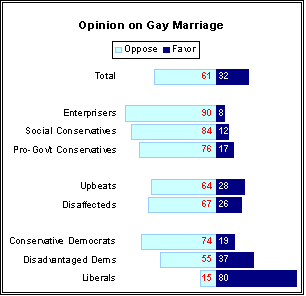 Fully 90% of Enterprisers are opposed to gay marriage. Social Conservatives are close behind at 84% opposition (with 65% strongly
Fully 90% of Enterprisers are opposed to gay marriage. Social Conservatives are close behind at 84% opposition (with 65% strongly
opposed, the highest of any group). Majorities in all of the other groups except Liberals also oppose gay marriage by wide margins. Conservative Democrats oppose gay marriage by roughly four-to-one (74%-19%), and Disadvantaged Democrats oppose it by (55%-37%). But 80% of Liberals favor gay marriage, more than twice the percentage in each of the other two Democratic groups.
Nearly half of Americans (46%) say they have a friend, colleague, or family member who is gay, with Republicans (at 40%) a little less likely than Democrats (51%) to say this. Liberals are much more apt than those in other typology groups to say they have a gay associate or family member (73% vs. less than 50% in any other group).
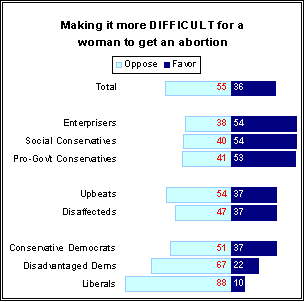
Abortion Divides Most Groups
Abortion remains a contentious issue, with nearly all groups in the typology divided to some extent. Overall, 55% oppose making it more difficult for a woman to obtain an abortion, while 36% disagree. By roughly a five-to-four margin, each of the three GOP-leaning groups favors greater restrictions on abortion.
Pluralities or majorities of all other groups oppose making abortions more difficult to obtain. But sizable minorities of Conservative Democrats, Upbeats, and Disaffecteds (37% each) support tougher restrictions on abortion.
Stem Cell Splits the GOP
 Public sentiment in favor of conducting stem cell research appears to be growing. Most Americans (56%) say it is more important to conduct stem cell research that may result in medical cures, while only about a third (32%) believe it is more important to avoid destroying the potential life of human embryos involved in such research. In 2002, 43% felt it was more important to conduct stem cell research.
Public sentiment in favor of conducting stem cell research appears to be growing. Most Americans (56%) say it is more important to conduct stem cell research that may result in medical cures, while only about a third (32%) believe it is more important to avoid destroying the potential life of human embryos involved in such research. In 2002, 43% felt it was more important to conduct stem cell research.
Solid majorities of the Democratic-leaning groups support stem cell research, with Liberals expressing the greatest support (84%). Republican-leaning groups, by contrast, are much more divided. By small margins, Enterprisers and Social Conservatives say it is more important to avoid destroying the potential life of human embryos than to conduct research that may lead to medical advances; Pro-Government Conservatives are about evenly split.
Significantly, the middle groups in the typology fall closer to the Democratic side than to the Republican side, with 53% each of Upbeats and Disaffecteds believing it is more important to conduct stem cell research than to avoid destroying embryos.
 In December 2004, nearly half of the public (47%) reported having heard “a lot” about the issue of stem cell research, up five points from August. Awareness of the stem cell issue was much higher among Liberals (71% had heard a lot) and the Enterprisers (63%) than among other typology groups.
In December 2004, nearly half of the public (47%) reported having heard “a lot” about the issue of stem cell research, up five points from August. Awareness of the stem cell issue was much higher among Liberals (71% had heard a lot) and the Enterprisers (63%) than among other typology groups.
Creationism and the Ten Commandments
Two religious issues recently in the news are the teaching of creationism in public schools and the propriety of displaying the Ten Commandments publicly in government buildings. Majorities of Americans support both of these ideas, with nearly three-quarters (74%) saying the public display of the commandments is proper, and 57% in favor of teaching creationism, along with evolution, in public schools. One-third of the public (33%) favors the teaching of creationism instead of evolution.
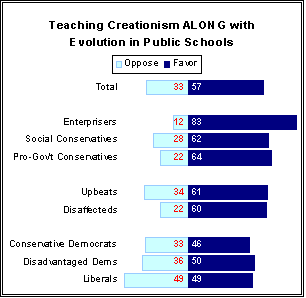 On both issues, there is relatively little variation in support across the typology, with two important exceptions. Liberals stand out for their strong belief that the display of the Ten Commandments in government buildings is improper 61% of Liberals say that, compared with no more than 16% in any other group. The other Democratic groups are in line with Republican-leaning groups expressing the view that the public display of the commandments is proper.
On both issues, there is relatively little variation in support across the typology, with two important exceptions. Liberals stand out for their strong belief that the display of the Ten Commandments in government buildings is improper 61% of Liberals say that, compared with no more than 16% in any other group. The other Democratic groups are in line with Republican-leaning groups expressing the view that the public display of the commandments is proper.
On the teaching of evolution, it is the Enterprisers who stand out. While between 46% and 64% of every other group favors the teaching of creationism, fully 83% of Enterprisers do so. But on the question of whether creationism should be taught instead of evolution, Social Conservatives are most supportive about half (51%) would remove evolution from the schools and replace it with creationism.
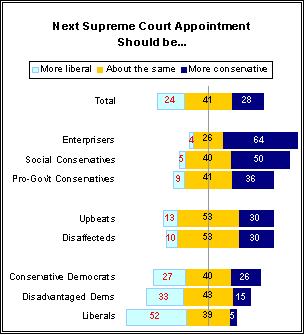
The Supreme Court
With respect to President Bush’s next appointment to the Supreme Court, a plurality of Americans (41%) believe Bush should choose someone who will keep the court about the same as it is now, while roughly equal numbers support a more conservative nominee (28%) or a more liberal one (24%).
Only two groups, Enterprisers (64%) and Social Conservatives (50%), clearly favor a choice that would make the court more conservative.
In five of the other groups, pluralities or, in the case of Upbeats and Disaffecteds, majorities feel that the president should choose someone who would keep the Court’s ideological balance about the same as it is now. Most Liberals (52%) would prefer a nominee who will make the court more liberal.
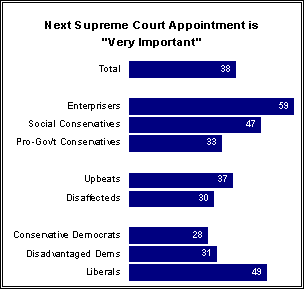 Nearly six-in-ten Enterprisers (59%) say the choice is very important personally, as do roughly half of Liberals (49%) and Social Conservatives (47%). Fewer than four-in-ten in the other typology groups attach great personal importance to the choice of the next Supreme Court justice.
Nearly six-in-ten Enterprisers (59%) say the choice is very important personally, as do roughly half of Liberals (49%) and Social Conservatives (47%). Fewer than four-in-ten in the other typology groups attach great personal importance to the choice of the next Supreme Court justice.
Views of ‘Christian Conservative’ Movement
Majorities of all of the typology groups consider the United States to be “a Christian nation,” with 71% overall saying that it is. Liberals and Disadvantaged Democrats are least likely to agree, but even among these groups, 57% say the U.S. is a Christian nation.
 Yet despite this view and the predominance of the Christian tradition among personal religious choices, public opinion is divided regarding the Christian conservative movement.
Yet despite this view and the predominance of the Christian tradition among personal religious choices, public opinion is divided regarding the Christian conservative movement.
About four-in-ten (41%) have a favorable view of the movement, while 34% have an unfavorable view. Republicans are strongly favorable (61% vs. 16% unfavorable), while opinion among Democrats tilts negative (35% vs. 45%).
The Democratic groups are divided in their views of the Christian conservative movement, with Conservative Democrats favorably disposed (53% positive, 18% negative), and Liberals sharply negative (78% unfavorable of those, 46% very unfavorable).
Part Two: Economic and Domestic Policy
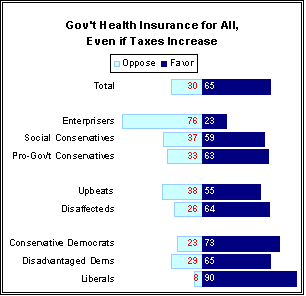 Republicans are less cohesive on matters involving economic policies than on cultural and foreign affairs issues. These differences are most obvious with respect to such issues as the desirability of government-guaranteed health insurance, stricter bankruptcy laws, and in attitudes toward tax reduction. Democrats, by contrast, are much more unified on these issues.
Republicans are less cohesive on matters involving economic policies than on cultural and foreign affairs issues. These differences are most obvious with respect to such issues as the desirability of government-guaranteed health insurance, stricter bankruptcy laws, and in attitudes toward tax reduction. Democrats, by contrast, are much more unified on these issues.
Among GOP groups, Pro-Government Conservatives are generally supportive of an activist government, particularly in helping the poor. Enterprisers, by contrast, stand out for their broad support for tax cuts and opposition to expanding government programs.
Health Insurance, Minimum Wage
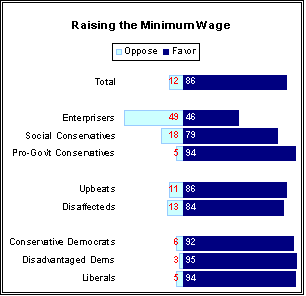 Solid majorities of every group, with the sole exception of Enterprisers, favor a government guarantee of health insurance for all Americans, even if it means raising taxes. Across the electorate, support for guaranteed health insurance ranges from 55% among Upbeats and 59% among Social Conservatives to 90% among Liberals. By contrast, Enterprisers strongly oppose guaranteed health insurance for all, if it means higher taxes (76% oppose, 23% favor).
Solid majorities of every group, with the sole exception of Enterprisers, favor a government guarantee of health insurance for all Americans, even if it means raising taxes. Across the electorate, support for guaranteed health insurance ranges from 55% among Upbeats and 59% among Social Conservatives to 90% among Liberals. By contrast, Enterprisers strongly oppose guaranteed health insurance for all, if it means higher taxes (76% oppose, 23% favor).
Similarly, overwhelming support for an increase in the minimum wage extends across all groups, again with the exception of Enterprisers. Overall 86% of the public favors a hike in the minimum wage from its current level of $5.15 to $6.45 per hour. More than 90% of Pro-Government Conservatives, Conservative Democrats, Disadvantaged Democrats and Liberals support such an increase. Among Enterprisers, however, a plurality (49%) opposes the move, although nearly as many (46%) favor it.
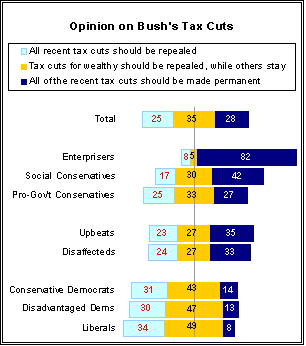
Taxes and Budget
On tax policy, Enterprisers stand alone in their view shared by 82% in this group that all of the tax cuts from President Bush’s first term be made permanent. By contrast, only about half as many Social Conservatives (42%) and even fewer Pro-Government Conservatives (27%) support making all of the tax cuts permanent.
By about a two-to-one margin, most of the electorate would give higher priority to reducing the federal budget deficit than to cutting taxes. That margin holds roughly true across all groups with a few exceptions: Liberals, who choose deficit cutting over tax cutting by an overwhelming margin (83% to 14%); Disaffecteds, who opt for deficit cutting by a relatively small margin (47%-42%); and Enterprisers who, alone among typology groups, give tax cuts priority over deficit reduction, by a margin of 50% to 43%.
 However, majorities in all the groups, except Liberals, agree that while reducing the federal budget deficit is an important priority, it should not be the top priority for the president and Congress to deal with this year.
However, majorities in all the groups, except Liberals, agree that while reducing the federal budget deficit is an important priority, it should not be the top priority for the president and Congress to deal with this year.
Even among Liberals, just half (50%) rate deficit reduction a top priority. Enterprisers are least likely to deem red ink curtailment a top priority–23% of the group does so, compared with 59% who call it an important but lower priority. Across the other groups, the percentages rating deficit reduction a top priority range from slightly less than a third among Social Conservatives and Upbeats, to about four-in-ten (41% to 45%) among Disadvantaged Democrats, Conservative Democrats, Disaffecteds, and Pro-Government Conservatives.
A similar pattern is seen with regard to opinions about ways to reduce the budget deficit. A majority of the public (54%) supports cutting domestic spending to reduce the deficit; about a third each favor cuts in military spending (35%) or raising taxes (31%).
At one extreme, 81% of Enterprisers favor cutting spending on domestic programs to reduce the deficit. They are joined in that view by 60% or more among Social Conservatives and Upbeats. Disadvantaged Democrats are the most reluctant to cut domestic spending, with only 29% in favor. Still, nearly half (48%) of Liberals, as well as the same proportion of Conservative Democrats, also support cuts in domestic spending to reduce the deficit.
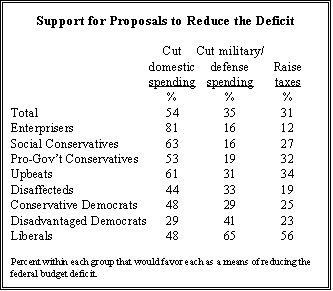 Where the Liberals differ most from other groups on budget issues is in their willingness to cut defense and military spending to reduce the deficit (65% favor such cuts). By contrast, among all other groups, support for military and defense cuts ranges from a low of 16% among Enterprisers and Social Conservatives to 41% among Disadvantaged Democrats.
Where the Liberals differ most from other groups on budget issues is in their willingness to cut defense and military spending to reduce the deficit (65% favor such cuts). By contrast, among all other groups, support for military and defense cuts ranges from a low of 16% among Enterprisers and Social Conservatives to 41% among Disadvantaged Democrats.
In addition, a far higher percentage of Liberals than those in other groups would raise taxes to reduce the deficit. More than half of Liberals (56%) support raising taxes to meet the goal of deficit reduction no more than about a third in any other group agree (Upbeats 34%). At the low end, just 12% of Enterprisers favor raising taxes for this purpose.
Bankruptcy, Malpractice Awards
On issues affecting the courts, the surveys also find divisions cutting across partisan lines. For example, bankruptcy laws allowing individuals deeply in debt to seek protection from their creditors realign several normally Republican or Republican-leaning groups with predominately Democratic groups.
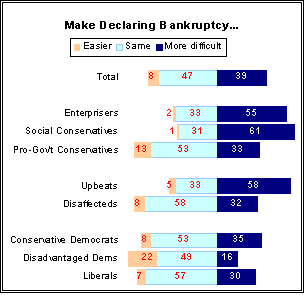 At a time when Congress had under consideration legislation making it more difficult for individuals to file for bankruptcy protection legislation that was signed into law by the president a month later (April 20, 2005)
At a time when Congress had under consideration legislation making it more difficult for individuals to file for bankruptcy protection legislation that was signed into law by the president a month later (April 20, 2005)
the March survey found that 39% of the general public favors stricter rules. Overall, a 47% plurality of the public feels that no change is needed in bankruptcy protections for debtors, while 8% say that access to bankruptcy should be made easier, rather than more difficult, for individuals.
Both ideological and economic factors are evident in opinions toward bankruptcy. Majorities of the relatively affluent Enterprisers and Upbeats (55% and 58%, respectively) think that the laws should make it more difficult for individuals to claim bankruptcy. However, a third in both groups favor leaving bankruptcy law as it was at the time of the survey in March. Social Conservatives, although somewhat less financially secure as a group than the Enterprisers or Upbeats, are at least as supportive of making bankruptcy more difficult to declare, with 61% favoring stricter laws.
Pro-Government Conservatives, however, part company with their more affluent fellow Republicans on the bankruptcy issue. Only a third (33%) would make personal bankruptcy more difficult, while 53% would leave the law unchanged, and 13% would make bankruptcy easier. In this, their views are not dissimilar from those of other financially strained groups in the center and Democratic portions of the political spectrum. The economically pressured and GOP-leaning Disaffecteds also oppose tightening the bankruptcy laws. While only 8% favor making it easier to declare bankruptcy, 58% would retain current provisions.
On the Democratic side, about 50%-60% of the three groups favor maintaining the status quo. However, a relatively large minority of Disadvantaged Democrats (22%) believe it should be easier for people to declare bankruptcy.
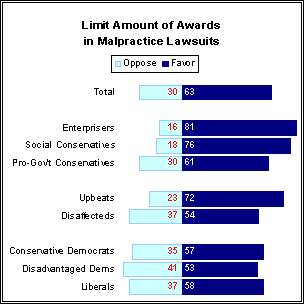 On the question of limiting awards in medical malpractice lawsuits, typology groups are in rare unanimity. Majorities in every group favor such limitations. Enterprisers provide the strongest support for limiting malpractice awards (81% favor) followed by Social Conservatives (76% favor) and Upbeats (72%).
On the question of limiting awards in medical malpractice lawsuits, typology groups are in rare unanimity. Majorities in every group favor such limitations. Enterprisers provide the strongest support for limiting malpractice awards (81% favor) followed by Social Conservatives (76% favor) and Upbeats (72%).
However, support remains strong across the political spectrum with Liberals favoring malpractice award limits by a margin of 58% in favor to 37% opposed. The least enthusiastic, but still net favorable groups, are Disaffecteds (54% favor, 37% opposed) and Disadvantaged Democrats (53% vs. 41%).
Jobs and Trade
The public generally takes a negative view of the hiring by U.S. businesses of lower-cost workers in other countries to produce goods and services. About seven-in-ten Americans (69%) believe “outsourcing” is a bad thing because it sends good jobs overseas; just 22% feel it is good because it keeps costs down.
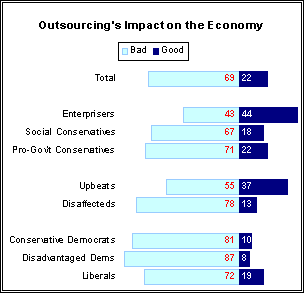 Among the typology groups, only the steadfastly pro-business Enterprisers are torn on this issue, with 44% viewing outsourcing positively, and 43% negatively.
Among the typology groups, only the steadfastly pro-business Enterprisers are torn on this issue, with 44% viewing outsourcing positively, and 43% negatively.
Opposition is especially strong among less affluent typology groups. Nearly nine-in-ten Disadvantaged Democrats (87%) think outsourcing is bad for the economy because it sends jobs overseas; 81% of Conservative Democrats,78% of Disaffecteds, and 71% of Pro-Government Conservatives agree. However, even the upwardly mobile Upbeats take a generally dim view of outsourcing with a 55% majority calling it a bad thing, and just 37% offering a positive opinion of this trend.
There is little consensus, however, on the economic impact of regional and multilateral trade agreements such as the North American Free Trade Agreement (NAFTA) and the World Trade Organization (WTO).
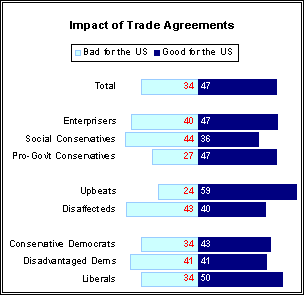 In no group does a majority describe such agreements as bad for the United States. Moreover, only among Social Conservatives and Disaffecteds do pluralities express disapproval (44% of Social Conservatives, 43% of Disaffecteds). Even Disadvantaged Democrats are evenly split (41%-41%) between the good and bad appellations.
In no group does a majority describe such agreements as bad for the United States. Moreover, only among Social Conservatives and Disaffecteds do pluralities express disapproval (44% of Social Conservatives, 43% of Disaffecteds). Even Disadvantaged Democrats are evenly split (41%-41%) between the good and bad appellations.
Yet there also is little apparent enthusiasm for such trade deals, aside from the pro-business Upbeats (59% good thing). Enterprisers and Liberals, the other two groups with high annual incomes, on balance believe such agreements are good for the U.S., but only about half in each group views them positively.
Enterprisers strongly favor allowing immigrants to enter and work in the United States legally for limited periods of time (by 71% to 26%).
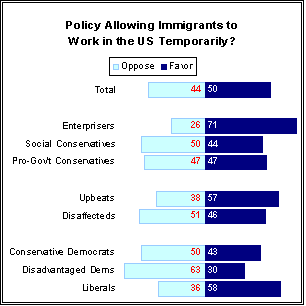 This issue produces an unusual alliance between Enterprisers and Liberals, who, reflecting their generally pro-immigrant stance, register high levels of support for such temporary visas (58%-36%), as do the pro-business Upbeats (57%-38%).
This issue produces an unusual alliance between Enterprisers and Liberals, who, reflecting their generally pro-immigrant stance, register high levels of support for such temporary visas (58%-36%), as do the pro-business Upbeats (57%-38%).
On this question, opposition falls along economic rather than party lines. While Disadvantaged Democrats are the group most reluctant to ease entry for immigrant workers, with 63% opposed and only 30% in favor, they are joined by majorities among Disaffecteds (51%), Social Conservatives and Conservative Democrats (50% in each group).
Protecting the Environment
Support for laws and regulations to protect the environment runs strongly among the public. As noted earlier, more than three-quarters (77%) believe the country should do whatever it takes to protect the environment and 63% subscribe to that view strongly.
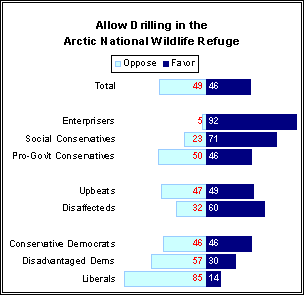 But the public, and the party coalitions, are divided over a proposal, currently before Congress, to permit oil and gas drilling in the Alaskan Arctic Wildlife Refuge.
But the public, and the party coalitions, are divided over a proposal, currently before Congress, to permit oil and gas drilling in the Alaskan Arctic Wildlife Refuge.
Among Republicans, Enterprisers overwhelmingly favor drilling (92%-5%), as does a solid majority of Social Conservatives (71%). But Pro-Government Conservatives are split, with 46% supporting the proposal and 50% opposed. And while Liberals strongly oppose oil and gas drilling in the Alaska refuge (by 85%-14%), Conservative Democrats are evenly divided (46%-46%).
Support for Private Accounts Slips
Opinions on the president’s proposal to allow younger workers to invest some of their Social Security taxes in private retirement accounts track more predictably along partisan lines.
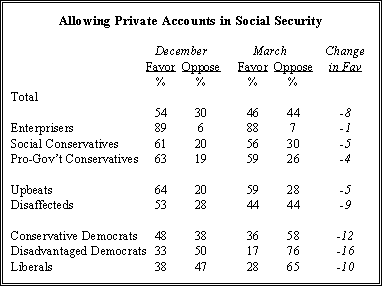 As general support for the plan has weakened since it was first announced, the March survey finds the overall public nearly evenly divided, with 46% favoring the idea and 44% opposed.
As general support for the plan has weakened since it was first announced, the March survey finds the overall public nearly evenly divided, with 46% favoring the idea and 44% opposed.
A comparison of the December and March surveys shows that support declined most sharply among Democratic groups. But there also has been significant erosion of support among the independent groups, especially the Disaffecteds. This group backed private accounts by nearly two-to-one in December; currently, Disaffecteds are evenly split over the idea.
The proposal, however, still garners the support of nearly nine-in-ten Enterprisers (88%), and majorities in the other GOP groups, as well as 59% of Upbeats. However, no more than about a third in any of the Democratic groups support private accounts (36% of Conservative Democrats).
Part Three: Military and Foreign Policy
The partisan lines dividing the electorate come into sharpest focus on issues involving current foreign and military policies. Support for the use of military force is strongest among groups that are reliably Republican, somewhat less so among centrist groups, and weakest among Democratic groups.
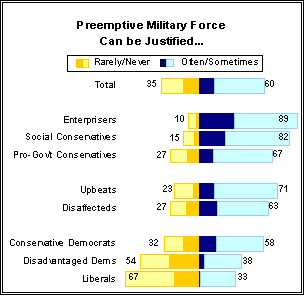 Public opinion is cautiously in favor of at least the occasional use of U.S. military force against countries that have not attacked the U.S., but may seriously threaten America. At the extremes, only 14% think preemption is often justified, while the same number think preemption is never justified. The plurality (46%) takes the view that it is sometimes justified, and 21% think it is justified at least on rare occasions.
Public opinion is cautiously in favor of at least the occasional use of U.S. military force against countries that have not attacked the U.S., but may seriously threaten America. At the extremes, only 14% think preemption is often justified, while the same number think preemption is never justified. The plurality (46%) takes the view that it is sometimes justified, and 21% think it is justified at least on rare occasions.
Across groups in the electorate, these proportions vary substantially. Enterprisers are the most likely to support preemption, with about nine-in-ten (89%) saying it is sometimes (57%) or often (32%) justified. Nearly as many Social Conservatives say preemptive military action is at least sometimes justified (82%), but there is less support for this idea among Pro-Government Conservatives (67%).
Moving leftward across the political spectrum, reservations about the use of preemptive military force increase. Only about four-in-ten Disadvantaged Democrats (38%) and fewer Liberals (33%) believe preemptive military action is often or sometimes justified.
Iraq Attitudes Polarized
The same pattern is displayed even more clearly with respect to the U.S. invasion of Iraq in 2003. The consistently wide partisan divisions over the war are seen in the opinions of the typology groups. In the December survey, Enterprisers (94%), Social Conservatives (88%) and Pro- Government Conservatives (72%) endorsed the war by overwhelming majorities. So too did two-thirds of Upbeats (66%) and half of Disaffecteds.
Government Conservatives (72%) endorsed the war by overwhelming majorities. So too did two-thirds of Upbeats (66%) and half of Disaffecteds.
Among Democratic groups, opposition to the Iraq war is equally strong. Liberals judge the war a mistake by a lopsided 87%-11% margin. Conservative Democrats oppose it by two-to-one, (61% wrong decision versus 28% right decision), while support is even lower among Disadvantaged Democrats (76% to 15%).
However, opinions shift with respect to the question of whether the government should keep U.S. troops in Iraq until the situation there stabilizes, or bring them home as quickly as possible. Enterprisers, Social Conservatives and Pro-Government Conservatives maintain nearly as high levels of support (88%, 81% and 68%, respectively) for keeping U.S. troops in Iraq as they did for their initial deployment.
Conservative Democrats and Disadvantaged Democrats, who opposed the decision to go to war by substantial margins, want U.S. troops withdrawn quickly. But Liberals the group most inclined to view the Iraq intervention as a mistake are divided on this point. A majority of Liberals (52%) say they would keep troops in Iraq, compared with 44% who would now bring them home.
Can Torture Be Justified?
Overall, the public is divided over using torture against suspected terrorists when such tactics may yield important information. Roughly half (51%) say it is never or rarely justified, but 45% believe it is at least sometimes justified.
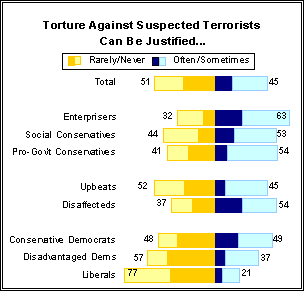 Liberals are most strongly opposed to resorting to torture; 77% say it is rarely or never justified. But that number falls to 57% among Disadvantaged Democrats, and Conservative Democrats are evenly split over whether torturing terrorist suspects can be justified. Majorities of Disaffecteds and of the three GOP groups believe the torture of suspected terrorists can at least sometimes be justified.
Liberals are most strongly opposed to resorting to torture; 77% say it is rarely or never justified. But that number falls to 57% among Disadvantaged Democrats, and Conservative Democrats are evenly split over whether torturing terrorist suspects can be justified. Majorities of Disaffecteds and of the three GOP groups believe the torture of suspected terrorists can at least sometimes be justified.
Patriot Act: Ideological Divisions
The Patriot Act almost perfectly encapsulates the black-and-white differences in the national security attitudes of Enterprisers and Liberals. Fully 73% of Enterprisers see the Patriot Act as a necessary tool in the war on terror; a virtually identical percentage of Liberals (71%) say the Patriot Act goes too far and threatens civil liberties. And while many Americans are only dimly aware of the act from half to two-thirds of most groups in the electorate say they know little or nothing about it awareness is greatest among the Enterprisers and Liberals.
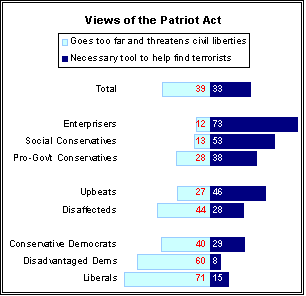 Other typology groups fall somewhere between these extremes, although Disadvantaged Democrats also register strong objections to the Patriot Act. Significantly, while Pro-Government Conservatives are more supportive of an activist government than are other GOP groups, many have reservations about the Patriot Act. A small plurality of Pro-Government Conservatives (38%) deem it a necessary tool, compared with 28% saying it goes too far and threatens civil liberties.
Other typology groups fall somewhere between these extremes, although Disadvantaged Democrats also register strong objections to the Patriot Act. Significantly, while Pro-Government Conservatives are more supportive of an activist government than are other GOP groups, many have reservations about the Patriot Act. A small plurality of Pro-Government Conservatives (38%) deem it a necessary tool, compared with 28% saying it goes too far and threatens civil liberties.
The Republican-leaning Disaffecteds, however, by a margin of 44% to 28% side with Democratic groups in thinking that the Patriot Act’s costs to civil liberties outweigh its benefits in fighting terrorism. Upbeats, the other independent group, support the act by a similar margin (46%-27%).
Favorability Ratings: Muslims, the U.N.
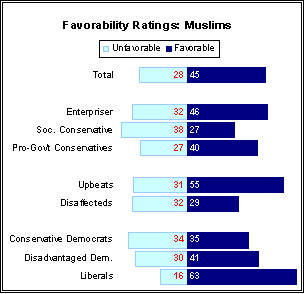 Regardless of their opinion on Islamic terrorism and their view of U.S. military action in Iraq, most Americans do not harbor negative feelings toward members of the Muslim faith in general. A plurality (45%) expresses a favorable opinion of Muslims, while only 28% have an unfavorable assessment. A significant minority (27%) says they are not familiar enough with Muslims to offer an opinion.
Regardless of their opinion on Islamic terrorism and their view of U.S. military action in Iraq, most Americans do not harbor negative feelings toward members of the Muslim faith in general. A plurality (45%) expresses a favorable opinion of Muslims, while only 28% have an unfavorable assessment. A significant minority (27%) says they are not familiar enough with Muslims to offer an opinion.
Favorable views are highest among the relatively well-educated Liberals (63%) and Upbeats (55%). Among Social Conservatives, negative views of Muslims outweigh positive ones by 38%-27%, and two other groups are about evenly divided: the Disaffecteds (32% unfavorable/29% favorable) and Conservative Democrats (34%/35%).
Attitudes toward the United Nations divide in a more predictably partisan pattern. The public, by a margin of 59% to 32%, has a favorable view of the world body. Among Enterprisers, however, just 15% have a favorable opinion of the U.N., compared with 82% who express a negative opinion. A majority in only one other group, Social Conservatives, express a negative opinion of the U.N. (54% unfavorable).
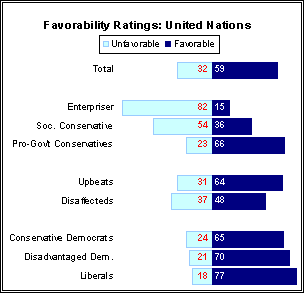 By contrast, two-thirds (66%) of Pro-Government Conservatives join with other groups in the center and left of the political spectrum in expressing positive views of the U.N. Liberals are the most likely to view the U.N. favorably (77% do so), but they are also joined in this view by 64% of Upbeats, 65% of Conservative Democrats and 70% of Disadvantaged Democrats.
By contrast, two-thirds (66%) of Pro-Government Conservatives join with other groups in the center and left of the political spectrum in expressing positive views of the U.N. Liberals are the most likely to view the U.N. favorably (77% do so), but they are also joined in this view by 64% of Upbeats, 65% of Conservative Democrats and 70% of Disadvantaged Democrats.


